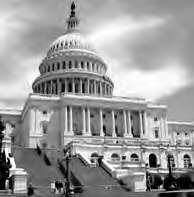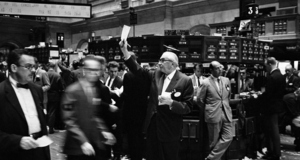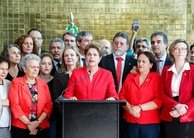|
From Cornell International Affairs Review VOL. 2 NO. 2 In Praise of Populism: The Coming Reconstruction of Financial Regulation
But in Clinton's second term, with a rambunctious Republican majority in the House and Senate, and the president in full "triangulation" mode, populism gave way to a neoliberal juggernaut led by the president himself. The 1933 Glass-Steagall Act separating investment and deposit banking was repealed, with strong presidential support, by the Gramm-Leach-Bliley Act in 1999, and administration economic advisors Larry Summers and Robert Rubin (along with Fed chair Alan Greenspan) formed a bi-partisan alliance with congressional Republican deregulators led by Texas Senator Phil Gramm to loosen the last restraints on financial creativity. When those fateful regulatory actions of 1999-2000 and the Bush era's broadbased deregulation program are undone with a new surge of financial regulation this year, we may well see the old financial populism reborn in Congress, with a mostly Democratic coalition (perhaps joined by a few farm region Republicans). It will probably resemble the Democratic-led populist coalitions of the early 1980s and 1990s.

The U.S. Capitol Building, in Washington D.C.
The Republican Party has currently retreated to its southern/plains/mountain bastions (regions that were, in fact, the 1892 populist/Democratic base, but now constitute the electoral map's solid red regions); but red/blue polarization appears more prominently on taxation and budget matters. In this economically remarkable period, the commitment to rebuilding a strong regulatory system may enjoy some bipartisan support.21 One of the interesting debates will be on whether to make the Federal Reserve Board the national "systemic regulator" with extensive discretion to supervise and intervene in the practices of financial and insurance firms deemed too large to fail.
As discussed above, there are deep reservations in both parties about investing the Fed with this unprecedented and highly discretionary regulatory power. This is particularly true in the House, which has less influence over the Fed (given the Senate's sole participation in confirming executive appointments), and which has historically had a very rocky relationship with the central bankers. Agencies of proven competence (and more respect for Congress) like the Federal Deposit Insurance Corporation, and even the Securities Exchange Commission and Commodity Futures Regulatory Commission as they existed before 2000 have historically enjoyed more popularity in the legislature. But regulatory fragmentation is now recognized as a large part of the problem, so those reservations may have to be overcome, with soothing promises from Fed Chair Bernanke.
President Obama probably saw himself, before the summer of 2008 when the financial crash became so visible, as another "triangulating" president in the Clinton mold. He relied on Clinton's Treasury Secretary Robert Rubin, and his Economic Council chair, Larry Summers, for advice, though their "insider" status and Rubin's role in the deregulation juggernaut and the downfall of Citicorp were evident. He even brought into his advisory circle Paul Volcker, Jimmy Carter's Fed nemesis, despised by congressional populists in the early 1980s. Since taking office, he has continued the Bush administration's bailout policies, with few restrictions on the rescued firms. Like all presidents, he endorses new regulation only if it leaves considerable discretion to his conservative economic policy appointees. He has even used a version of Clinton's "good cop, bad cop" game in trying to convince financial elites to support a modicum of regulation. As he told a recent gathering of major bankers, "My administration is the only thing between you and the pitchforks."22
What sort of new regulatory system emerges from this president-Congress-Wall Street tug of war will depend on how much societal pressure is felt by members of Congress to punish the capitalists who brought down the world economy, and keep them from doing it again. In severe crises, as Frances Fox Piven and Richard Cloward have argued, economic elites are discredited and an opening to the left appears, which, in combination with social unrest and mobilization of the havenots, can produce rare episodes of reform.23 But as IMF economist Simon Johnson argues, the elite American financiers who caused the crisis, with their "ever larger gambles with the implicit backing of the government, until the inevitable collapse,…are now using their influence to prevent precisely the sorts of reforms that are needed, and fast, to pull the economy out of a nosedive."24
The New Deal did dethrone some of the era's financial oligarchs, but Johnson is pessimistic that today's financial elite, more powerful than ever, can be persuaded, or threatened, to allow re-regulation. What is really needed, he argues, is to break up the elephantine structure of economic and political power that is today's financial sector.25
The New Deal was able to do this to the worst surviving offenders—the public utility behemoths that had defrauded so many investors. The 1935 Public Utility Holding Company Act that broke them up into less powerful pieces was a populist triumph that seems impossible today. Indeed, the Obama administration (like its predecessor) is going the other way. It is encouraging banks and investment firms to merge, and helping the giants to stay afloat with public subsidies. The administration is even working to help the large bailed-out firms escape congressionally-mandated restrictions, with Treasury-discovered loopholes and Enronstyle special entities.26 Given the huge sums candidates in the U.S. electoral system have to raise, and the increasingly "plebiscitary"27 nature of presidents who are self-recruited and self-financed (rather than chosen and supported by their party activists and officials, or public funding), the power of those with large reserves of cash for electoral campaigns may have passed a tipping point that leaves regulatory populism impotent.
It is, however, too early to rule out that the politically-astute president will join the gang with the pitchforks. Certainly, the fact that the ranks of the pitchfork wielders have now swelled to include French and German leaders will increase the pressure on Obama to raise a trident of his own.
Professor Elizabeth Sanders, Professor of Government, Cornell University
- "Will There Be Blood?" an alarmed Economist asked on March 26, incongruously placing that headline above a photo of a well-dressed mature woman carrying a "No More Greed" sign in front of the National Bank of New Hampshire. More evidence of this ominous "spasm of fury" could be found, in the journal's view, in "a recent Harris poll show[ing] that 85% of Americans believe that big companies have too much influence on politicians and policymakers." Surveys also revealed that "The proportion of people expressing "a great deal of confidence" fell from 30% in 2000 to 16% in 2008 for big business, from 30% to 19% for banks, from 29% to 20% for organised religion." Quelle surprise. http://www.economist.com/world/unitedstates/PrinterFriendly.cfm?story_id=13375986&CFID=48720765&CFTOKEN=83861639. Typically, though, "populist outrage" is evidenced by quotations from Republican congressmen and conservative radio commentators like Rush Limbaugh-representatives whose legitimacy as spokesmen for "Populists" would no doubt be questioned by the original agrarian and labor populists. One historically accurate commentary was the contribution by historian Michael Kazin, author of a much-praised biography of William Jennings Bryan, in Newsweek's cover story on "Populist Rage," March 30, 2009, 23-24. As Kazin summarizes, "At its core, populism in the United States remains what it has always been: a protest by ordinary people who want the system to live up to its stated ideals-fair and honest treatment in the marketplace and a government tilted in favor of the unwealthy masses. The best way for big men, and big women, to respond to such protests is to try to do what is moral, as well as popular—and treat Americans as partners in the grand enterprise of governance."
- In the fall of 2000 a lame-duck session of Congress passed a little-noticed piece of legislation called the "Commodity Futures Modernization Act." The bill kept the market for derivatives, credit default swaps and other exotic instruments off-limits to agencies that regulate more conventional assets like stocks, bonds and futures contracts. It was sponsored by Republican Senator Phil Gramm, and strongly supported by Pres. Clinton (whose appointees on the Commodity Futures Trading Corporation worked with Gramm to draft it), Alan Greenspan and Treasury Secretary Robert Rubin. The CFTC described it as a measure that would "provide U.S. financial markets the flexibility needed to maintain a leadership role in the global market arena." http://www.cftc.gov/opa/press00/opa4479-00.htm
- Geithner outlined four broad goals for a new regulatory system in his late March testimony before the House Financial Services Committee: 1. To give a single government regulatory body [most likely the Federal Reserve Board] broad powers to oversee large "systemically important" companies; (2) To provide stronger safeguards for consumers and investors; (3) To close gaps in the regulatory process (increasing hedge fund supervision, regulating the more exotic derivatives like credit default swaps, etc.); and (4) To improve international coordination of financial regulation. The Treasury Secretary and Federal Reserve Chairman have also requested immediate action on a proposal permitting federal regulators to take over and reorganize failed financial institutions not classified as banks (and hence not currently subject to the bank regulatory agencies). Representative Frank, chair of the House committee, has promised action on regulatory overhaul in May, though the administration will press for earlier action on a "systemic risk regulator" for "too large to fail" institutions. However, as Majority Leader Steny Hoyer told CQ, Congress members have become "increasingly wary of executive branch officials asking for broad new powers." Alabama Senator Richard C. Shelby, the ranking Republican on the Senate Banking Committee, also casts a jaded eye on the Fed as systemic risk regulator. "I see the Fed, as a bank regulator, big-time failing the American people," said Shelby. Senate Banking Committee Chairman Chris Dodd is also cautious about vesting so much power in the Federal Reserve Board, so the skepticism approaches a bipartisan consensus. At any rate, large and ambiguous grants of power in the style of the Paulson 2008 bailout bill are unlikely. Congressional Quarterly Weekly Report, March 30, 2009, 728. http://library.cqpress.com.proxy.library.cornell.edu/cqweekly/document.php?id=weeklyreport111-000003087459& Accessed March 30, 2009; Edmund L. Andrews and Louise Story, "U.S. to detail Plan to Reign In Finance World," New York Times March 26, 2009
- Michael D. Shear and Anthony Faiola, “Nations Craft Hard-Fought Pledge To Repair World Financial System: Plan Aims to Tighten Regulation, Increase Lending, Aid Poor Nations,” Washington Post, Friday, April 3, 2009; A01
- Kenneth S. Davis, FDR: The New Deal Years 1933-1937 (New York: Random House, 1979), 106-7, 153-55 and chapter 5, “The Wrecking of the London Conference,” 183-93; Elliot Rosen, Roosevelt, the Great Depression, and the Economics of Recovery (Charlottesville: University of Virginia Press, 2005), 28-37.
- Davis, FDR, 107
- Ibid, 156.
- “International policy is, for all the friendship and commonality, always also about representing the interests of one’s own country,” the German Chancellor recently observed. Nicholas Kulish and Judy Dempsey, “Merkel is Ready to Greet and then Resist Obama,” New York Times Global edition, March 30, 2009. Accessed March 30. http://www.nytimes.com/2009/03/30/world/europe/30merkel.html?ref=global-home&pagewanted=print
- A United Nations monetary and financial commission headed by Joseph Stiglitz issued its preliminary recommendations on March 19. They include the establishment of a Global Economic Council to co-ordinate economic policy, a Global Financial Regulatory Authority to undertake “deep and pervasive reforms in international financial transactions,” and a Financial Products Safety Commission. International bodies would establish some degree of supervision over derivatives and credit rating agencies, as well as other processes. See United Nations, ”Recommendations by the Commission of Experts of the President of the General Assembly on reforms of the international monetary and financial system,” March 19, 2009. http://www.un.org/ga/president/63/commission/financial_commission.shtml Accessed March 30, 2009.
- On regulatory state expansion in the Populist and progressive eras, see Arthur S. Link, Wilson, a biography in five volumes (Princeton, N.J.: Princeton University Press, 1947-1965); and Elizabeth Sanders, Roots of Reform (Chicago: University of Chicago Press, 1999); on New Deal regulatory politics, see Davis, FDR: The New Deal Years.
- Davis, ibid, 48. In 2009, as squads of expert accountants from the FDIC daily move into failing banks to reorganize them and protect the savings of depositors (much as agents from the regional Federal Reserve Banks did during the “Bank Holiday” of 1933), millions of Americans may count among their blessings that the impressively well-functioning FDIC was never dismantled, despite the Cornell International Affairs Review 18 continual protests of neoliberals that the system protected the weak against the salubrious Darwinian forces of the market.
- Sanders, Roots of Reform, 479 n. 56.
- See the list of hearings at the web site of the House of Representatives Committee on Financial Services, http://financialservices.house.gov/hearings_all.shtml
- In the early 1980s, the House banking committee was at the center of a fierce congressional campaign to take control of monetary policy away from the Federal Reserve Board, which, under Paul Volcker, was actively pursuing a deflationary policy unprecedented since 1932, with the consequence of high unemployment and business failures. Again in the early 1990s, the committee was in revolt against Fed deflationary policies that had had led to recession. See, on these interesting "populist" battles, Donald F. Kettl, Leadership at the Fed (New Haven: Yale University Press, 1986); William Greider, Secrets of the Temple,(New York: Simon and Schuster, 1987); and Steven K. Beckner, Back from the Brink (New York, John Wiley, 1996).
- In the 2008 electoral cycle, the leading campaign donation sector was finance, insurance, and real estate, which gave over $463 million in all federal races, a slim majority to Democrats. Barack Obama received over $38 million from the sector, leading John McCain by $10 million. Chris Dodd's presidential campaign received $5.6 million. In the House, the average Democratic and Republican candidates who received contributions from this sector (and most did) got about $200 thousand. Rep. Rahm Emmanuel, now Obama's Chief of Staff, was the fifth highest recipient, with about $1.1 million. For the Securities and Investment industry component of this sector, the average House recipient got about $44 thousand; the average Senate recipient, about $480 thousand. Rahm Emmanuel topped that list in the House, with $660 thousand; Barney Frank got $236 thousand. Senators and presidential candidates Obama, McCain, and Clinton topped the Senate list of Securities and Investment industry donations. Chris Dodd was fourth, with $2.9 million. (Figures taken from http://www.opensecrets.org, accessed March 30, 2009). Dodd's closeness to, and previous services provided to and from large financial firms, have brought him such bad publicity that he may have a Democratic opponent in the primary, as well as strong Republican opposition for his 2010 reelection bid. That could encourage a new regulatory toughness on the Senate Banking Chair's part. See CNN Political Ticker, March 31, 2009. http://politicalticker.blogs.cnn.com/category/christopher-dodd/. Accessed April 4.
- Cyrus Sanati, "From Rep. Frank, a To-Do List for Changing Wall Street," New York Times, March 25, 2009. The House on April 1 passed, by 247-171, the Grayson-Himes "Pay for Performance" bill to tie executive compensation at firms receiving federal bailout funds to actual performance. http://www.nytimes.com/2009/03/26/business/26frank.html?scp=3&sq=Barney%20Frank&st=cse Accessed March 30, 2009. This bill was passed for the sake of our financial survival, Rep Grayson (D FL) reported. Taxpayers should not bankroll executives whose ridiculous gambles brought Americas financial system to the brink of collapse. The power the bill grants is pretty standard. The taxpayers now have an ownership stake in these companies. And owners of companies set salaries for their employees. Any company bent on paying its employees unreasonable and excessive compensation can do so after the American taxpayers get their money back. House Committee on Financial Services, April 1, 2010. http://financialservices.house.gov/ExecutiveCompensation.html. A stronger bill sponsored by Democratic Representative John Conyers had received a much closer House vote of 223-196, reflecting the discomfort of Republicans and 31 more conservative Democrats with the concept of government regulation of executive pay. The president also opposed the stronger bill. The alternative Grayson-Hines bill leaves much to Treasury discretion in setting standards for executive pay in the companies bailed out under the Troubled Asset Relief Program's $700 billion dollars. Like a March bill denying bonuses to executives of AIG (which passed the House 328-93), the Conyers bill would not likely have passed the Senate. Anne Flaherty, "House Passes New, weaker Bill in AIG Bonus Flap," Associated Press, April 1, 2009.
- Tony Czuczha and Mark Deen, “Merkel, Sarkozy Step Up Calls for Tighter Market Regulation,” Bloomberg.com, April 1. http://www.bloomberg.com/apps/news?pid=20601087&sid=auX5y02WWbmI&refer=home
- Legislative specificity is the way Congress maintains control of the implementation of policy. The executive branch, on the other hand, prefers wide discretion. The difference in preference is especially marked when there is divided party government. A good example is the three-page bank bailout bill submitted by Treasury Secretary Henry Paulson in September, 2008. The bill ultimately passed by Congress had grown to 104 pages, with significantly reduced (although still large) executive discretion.
- I have analyzed the history of financial populism in an unpublished paper entitled, “Congress and the Politics of Monetary Policy,” presented at the annual meetings of the American Political Science Association, September 3, 2000.
- Steven K. Beckner, Back from the Brink. Sanders, “Congress and the Politics of Monetary Policy.” The prime mover in the House, after the retirement of old school Texas populist Wright Patman, was Henry B. Gonzales of San Antonio Texas, a latter-day southern urban populist whose district had high unemployment, a very low median income, and half the mean percentage of households with interest income. In the Senate, eight Democrats and eight Republicans opposed Paul Volcker’s reappointment as Chair of the FRB in 1983: Democrats Heflin (AL), DeConcini (AZ), Cranston (CA), Kennedy (MA), Meltzer (MT), Metzenbaum (OH), Boren (OK), and Sasser (TN). The Republicans who joined the anti-Volcker coalition were Hawkins (FL), Sims and McClure (ID), Humphrey (NH), Helms (NC), Nickles (OK), Hatch (UT), and Wallop (WY).
- See note 16. There is, however, growing Republican uneasiness with limits on executive pay, for fear that even pay caps or bonus criteria restricted to bailed-out firms could set a dangerous precedent. See the conflict occasioned by the House Finance Committee’s earlier (2007) bill to have shareholder votes on executive compensation. http://www.house.gov/apps/list/speech/financialsvcs_dem/mu032107.shtml.
- Eamon Javers, “Inside Obama’s Bank CEO Meeting,”Politico.com, April 2, 2009. http://dyn.politico.com/printstory.cfm?uuid=6CD55D64-18FE-70B2-A89B1EF075F993F4
- Poor People’s Movements (New York: Random House, Vintage Books, 1977), 28-32, 113-33, 172-75
- Simon Johnson, “The Quiet Coup,” Atlantic May 2009. Online at http://www.theatlantic.com/doc/200905/imf-advice
- Ibid.
- So charge Amit R. Paley and David Cho in “Officials Aim to Help firms Avoid Bailout Restrictions,” Washington Post, April 4, 2009, A01.
- The term was popularized and anchored by Theodore J. Lowi, The Personal President (Ithaca: Cornell University Press, 1984).
Photos courtesy of:
Author
Professor Elizabeth Sanders, Professor of Government, Cornell University
Endnotes
- "Will There Be Blood?" an alarmed Economist asked on March 26, incongruously placing that headline above a photo of a well-dressed mature woman carrying a "No More Greed" sign in front of the National Bank of New Hampshire. More evidence of this ominous "spasm of fury" could be found, in the journal's view, in "a recent Harris poll show[ing] that 85% of Americans believe that big companies have too much influence on politicians and policymakers." Surveys also revealed that "The proportion of people expressing "a great deal of confidence" fell from 30% in 2000 to 16% in 2008 for big business, from 30% to 19% for banks, from 29% to 20% for organised religion." Quelle surprise. http://www.economist.com/world/unitedstates/PrinterFriendly.cfm?story_id=13375986&CFID=48720765&CFTOKEN=83861639. Typically, though, "populist outrage" is evidenced by quotations from Republican congressmen and conservative radio commentators like Rush Limbaugh-representatives whose legitimacy as spokesmen for "Populists" would no doubt be questioned by the original agrarian and labor populists. One historically accurate commentary was the contribution by historian Michael Kazin, author of a much-praised biography of William Jennings Bryan, in Newsweek's cover story on "Populist Rage," March 30, 2009, 23-24. As Kazin summarizes, "At its core, populism in the United States remains what it has always been: a protest by ordinary people who want the system to live up to its stated ideals-fair and honest treatment in the marketplace and a government tilted in favor of the unwealthy masses. The best way for big men, and big women, to respond to such protests is to try to do what is moral, as well as popular—and treat Americans as partners in the grand enterprise of governance."
- In the fall of 2000 a lame-duck session of Congress passed a little-noticed piece of legislation called the "Commodity Futures Modernization Act." The bill kept the market for derivatives, credit default swaps and other exotic instruments off-limits to agencies that regulate more conventional assets like stocks, bonds and futures contracts. It was sponsored by Republican Senator Phil Gramm, and strongly supported by Pres. Clinton (whose appointees on the Commodity Futures Trading Corporation worked with Gramm to draft it), Alan Greenspan and Treasury Secretary Robert Rubin. The CFTC described it as a measure that would "provide U.S. financial markets the flexibility needed to maintain a leadership role in the global market arena." http://www.cftc.gov/opa/press00/opa4479-00.htm
- Geithner outlined four broad goals for a new regulatory system in his late March testimony before the House Financial Services Committee: 1. To give a single government regulatory body [most likely the Federal Reserve Board] broad powers to oversee large "systemically important" companies; (2) To provide stronger safeguards for consumers and investors; (3) To close gaps in the regulatory process (increasing hedge fund supervision, regulating the more exotic derivatives like credit default swaps, etc.); and (4) To improve international coordination of financial regulation. The Treasury Secretary and Federal Reserve Chairman have also requested immediate action on a proposal permitting federal regulators to take over and reorganize failed financial institutions not classified as banks (and hence not currently subject to the bank regulatory agencies). Representative Frank, chair of the House committee, has promised action on regulatory overhaul in May, though the administration will press for earlier action on a "systemic risk regulator" for "too large to fail" institutions. However, as Majority Leader Steny Hoyer told CQ, Congress members have become "increasingly wary of executive branch officials asking for broad new powers." Alabama Senator Richard C. Shelby, the ranking Republican on the Senate Banking Committee, also casts a jaded eye on the Fed as systemic risk regulator. "I see the Fed, as a bank regulator, big-time failing the American people," said Shelby. Senate Banking Committee Chairman Chris Dodd is also cautious about vesting so much power in the Federal Reserve Board, so the skepticism approaches a bipartisan consensus. At any rate, large and ambiguous grants of power in the style of the Paulson 2008 bailout bill are unlikely. Congressional Quarterly Weekly Report, March 30, 2009, 728. http://library.cqpress.com.proxy.library.cornell.edu/cqweekly/document.php?id=weeklyreport111-000003087459& Accessed March 30, 2009; Edmund L. Andrews and Louise Story, "U.S. to detail Plan to Reign In Finance World," New York Times March 26, 2009
- Michael D. Shear and Anthony Faiola, “Nations Craft Hard-Fought Pledge To Repair World Financial System: Plan Aims to Tighten Regulation, Increase Lending, Aid Poor Nations,” Washington Post, Friday, April 3, 2009; A01
- Kenneth S. Davis, FDR: The New Deal Years 1933-1937 (New York: Random House, 1979), 106-7, 153-55 and chapter 5, “The Wrecking of the London Conference,” 183-93; Elliot Rosen, Roosevelt, the Great Depression, and the Economics of Recovery (Charlottesville: University of Virginia Press, 2005), 28-37.
- Davis, FDR, 107
- Ibid, 156.
- “International policy is, for all the friendship and commonality, always also about representing the interests of one’s own country,” the German Chancellor recently observed. Nicholas Kulish and Judy Dempsey, “Merkel is Ready to Greet and then Resist Obama,” New York Times Global edition, March 30, 2009. Accessed March 30. http://www.nytimes.com/2009/03/30/world/europe/30merkel.html?ref=global-home&pagewanted=print
- A United Nations monetary and financial commission headed by Joseph Stiglitz issued its preliminary recommendations on March 19. They include the establishment of a Global Economic Council to co-ordinate economic policy, a Global Financial Regulatory Authority to undertake “deep and pervasive reforms in international financial transactions,” and a Financial Products Safety Commission. International bodies would establish some degree of supervision over derivatives and credit rating agencies, as well as other processes. See United Nations, ”Recommendations by the Commission of Experts of the President of the General Assembly on reforms of the international monetary and financial system,” March 19, 2009. http://www.un.org/ga/president/63/commission/financial_commission.shtml Accessed March 30, 2009.
- On regulatory state expansion in the Populist and progressive eras, see Arthur S. Link, Wilson, a biography in five volumes (Princeton, N.J.: Princeton University Press, 1947-1965); and Elizabeth Sanders, Roots of Reform (Chicago: University of Chicago Press, 1999); on New Deal regulatory politics, see Davis, FDR: The New Deal Years.
- Davis, ibid, 48. In 2009, as squads of expert accountants from the FDIC daily move into failing banks to reorganize them and protect the savings of depositors (much as agents from the regional Federal Reserve Banks did during the “Bank Holiday” of 1933), millions of Americans may count among their blessings that the impressively well-functioning FDIC was never dismantled, despite the Cornell International Affairs Review 18 continual protests of neoliberals that the system protected the weak against the salubrious Darwinian forces of the market.
- Sanders, Roots of Reform, 479 n. 56.
- See the list of hearings at the web site of the House of Representatives Committee on Financial Services, http://financialservices.house.gov/hearings_all.shtml
- In the early 1980s, the House banking committee was at the center of a fierce congressional campaign to take control of monetary policy away from the Federal Reserve Board, which, under Paul Volcker, was actively pursuing a deflationary policy unprecedented since 1932, with the consequence of high unemployment and business failures. Again in the early 1990s, the committee was in revolt against Fed deflationary policies that had had led to recession. See, on these interesting "populist" battles, Donald F. Kettl, Leadership at the Fed (New Haven: Yale University Press, 1986); William Greider, Secrets of the Temple,(New York: Simon and Schuster, 1987); and Steven K. Beckner, Back from the Brink (New York, John Wiley, 1996).
- In the 2008 electoral cycle, the leading campaign donation sector was finance, insurance, and real estate, which gave over $463 million in all federal races, a slim majority to Democrats. Barack Obama received over $38 million from the sector, leading John McCain by $10 million. Chris Dodd's presidential campaign received $5.6 million. In the House, the average Democratic and Republican candidates who received contributions from this sector (and most did) got about $200 thousand. Rep. Rahm Emmanuel, now Obama's Chief of Staff, was the fifth highest recipient, with about $1.1 million. For the Securities and Investment industry component of this sector, the average House recipient got about $44 thousand; the average Senate recipient, about $480 thousand. Rahm Emmanuel topped that list in the House, with $660 thousand; Barney Frank got $236 thousand. Senators and presidential candidates Obama, McCain, and Clinton topped the Senate list of Securities and Investment industry donations. Chris Dodd was fourth, with $2.9 million. (Figures taken from http://www.opensecrets.org, accessed March 30, 2009). Dodd's closeness to, and previous services provided to and from large financial firms, have brought him such bad publicity that he may have a Democratic opponent in the primary, as well as strong Republican opposition for his 2010 reelection bid. That could encourage a new regulatory toughness on the Senate Banking Chair's part. See CNN Political Ticker, March 31, 2009. http://politicalticker.blogs.cnn.com/category/christopher-dodd/. Accessed April 4.
- Cyrus Sanati, "From Rep. Frank, a To-Do List for Changing Wall Street," New York Times, March 25, 2009. The House on April 1 passed, by 247-171, the Grayson-Himes "Pay for Performance" bill to tie executive compensation at firms receiving federal bailout funds to actual performance. http://www.nytimes.com/2009/03/26/business/26frank.html?scp=3&sq=Barney%20Frank&st=cse Accessed March 30, 2009. This bill was passed for the sake of our financial survival, Rep Grayson (D FL) reported. Taxpayers should not bankroll executives whose ridiculous gambles brought Americas financial system to the brink of collapse. The power the bill grants is pretty standard. The taxpayers now have an ownership stake in these companies. And owners of companies set salaries for their employees. Any company bent on paying its employees unreasonable and excessive compensation can do so after the American taxpayers get their money back. House Committee on Financial Services, April 1, 2010. http://financialservices.house.gov/ExecutiveCompensation.html. A stronger bill sponsored by Democratic Representative John Conyers had received a much closer House vote of 223-196, reflecting the discomfort of Republicans and 31 more conservative Democrats with the concept of government regulation of executive pay. The president also opposed the stronger bill. The alternative Grayson-Hines bill leaves much to Treasury discretion in setting standards for executive pay in the companies bailed out under the Troubled Asset Relief Program's $700 billion dollars. Like a March bill denying bonuses to executives of AIG (which passed the House 328-93), the Conyers bill would not likely have passed the Senate. Anne Flaherty, "House Passes New, weaker Bill in AIG Bonus Flap," Associated Press, April 1, 2009.
- Tony Czuczha and Mark Deen, “Merkel, Sarkozy Step Up Calls for Tighter Market Regulation,” Bloomberg.com, April 1. http://www.bloomberg.com/apps/news?pid=20601087&sid=auX5y02WWbmI&refer=home
- Legislative specificity is the way Congress maintains control of the implementation of policy. The executive branch, on the other hand, prefers wide discretion. The difference in preference is especially marked when there is divided party government. A good example is the three-page bank bailout bill submitted by Treasury Secretary Henry Paulson in September, 2008. The bill ultimately passed by Congress had grown to 104 pages, with significantly reduced (although still large) executive discretion.
- I have analyzed the history of financial populism in an unpublished paper entitled, “Congress and the Politics of Monetary Policy,” presented at the annual meetings of the American Political Science Association, September 3, 2000.
- Steven K. Beckner, Back from the Brink. Sanders, “Congress and the Politics of Monetary Policy.” The prime mover in the House, after the retirement of old school Texas populist Wright Patman, was Henry B. Gonzales of San Antonio Texas, a latter-day southern urban populist whose district had high unemployment, a very low median income, and half the mean percentage of households with interest income. In the Senate, eight Democrats and eight Republicans opposed Paul Volcker’s reappointment as Chair of the FRB in 1983: Democrats Heflin (AL), DeConcini (AZ), Cranston (CA), Kennedy (MA), Meltzer (MT), Metzenbaum (OH), Boren (OK), and Sasser (TN). The Republicans who joined the anti-Volcker coalition were Hawkins (FL), Sims and McClure (ID), Humphrey (NH), Helms (NC), Nickles (OK), Hatch (UT), and Wallop (WY).
- See note 16. There is, however, growing Republican uneasiness with limits on executive pay, for fear that even pay caps or bonus criteria restricted to bailed-out firms could set a dangerous precedent. See the conflict occasioned by the House Finance Committee’s earlier (2007) bill to have shareholder votes on executive compensation. http://www.house.gov/apps/list/speech/financialsvcs_dem/mu032107.shtml.
- Eamon Javers, “Inside Obama’s Bank CEO Meeting,”Politico.com, April 2, 2009. http://dyn.politico.com/printstory.cfm?uuid=6CD55D64-18FE-70B2-A89B1EF075F993F4
- Poor People’s Movements (New York: Random House, Vintage Books, 1977), 28-32, 113-33, 172-75
- Simon Johnson, “The Quiet Coup,” Atlantic May 2009. Online at http://www.theatlantic.com/doc/200905/imf-advice
- Ibid.
- So charge Amit R. Paley and David Cho in “Officials Aim to Help firms Avoid Bailout Restrictions,” Washington Post, April 4, 2009, A01.
- The term was popularized and anchored by Theodore J. Lowi, The Personal President (Ithaca: Cornell University Press, 1984).
Photos courtesy of:
Suggested Reading from Inquiries Journal
A number of reports have established a diagnosis of the financial crisis. The first was produced by the Financial Stability Forum, in April 2008 and was the basis for the preparation of the first G 20 meetings in 2008. The International Monetary Fund (IMF) and the G 30 produced updated analysis in 2008 and 2009. More recently, the... MORE»
This study examines the effects of the Dodd-Frank Act on community banks in the Northeastern region of the United States. Using annual financial data from years 2010 to 2014 gathered on 82 banks, a regression equation is estimated using the Generalized Method of Moments (GMM) technique described by Arellano and Bover (1995). The... MORE»
Since the financial crisis of 2007, regulators have recognized the necessity for global governance in an increasingly interconnected global economy. Many have praised the extent to which regulators have already minimized... MORE»
The recent economic crisis roved to be immensely threatening to the economic equilibrium within the European Union (EU). Beginning in the United States, it then proved its "domino effect" by covering the EU, resulting in so-called 'financial stress' in all the Member States.1 In this context, some possible explanations for the crisis are worth mentioning: unsustainable macroeconomic inequalities , a lack of adequate policies preventing adventurous... MORE»
Latest in Economics
2020, Vol. 12 No. 09
Recent work with the Economic Complexity Index (ECI) has shown that a country’s productive structure constrains its level of economic growth and income inequality. Building on previous research that identified an increasing gap between Latin... Read Article »
2018, Vol. 10 No. 10
The value proposition in the commercial setting is the functional relationship of quality and price. It is held to be a utility maximizing function of the relationship between buyer and seller. Its proponents assert that translation of the value... Read Article »
2018, Vol. 10 No. 03
Devastated by an economic collapse at the end of the 20th century, Japan’s economy entered a decade long period of stagnation. Now, Japan has found stable leadership, but attempts at new economic growth have fallen through. A combination of... Read Article »
2014, Vol. 6 No. 10
In July 2012, Spain's unemployment rate was above 20%, its stock market was at its lowest point in a decade, and the government was borrowing at a rate of 7.6%. With domestic demand depleted and no sign of recovery in sight, President Mariano Rajoy... Read Article »
2017, Vol. 9 No. 10
During the periods of the Agrarian Revolt and the 1920s, farmers were unhappy with the economic conditions in which they found themselves. Both periods witnessed the ascent of political movements that endeavored to aid farmers in their economic... Read Article »
2017, Vol. 7 No. 2
In 2009, Brazil was in the path to become a superpower. Immune to the economic crises of 2008, the country's economy benefitted from the commodity boom, achieving a growth rate of 7.5 per cent in 2010, when Rousseff was elected. A few years later... Read Article »
2012, Vol. 2 No. 1
The research completed aimed to show that the idea of fair trade, using the example of goals for the chocolate industry of the Ivory Coast, can be described as an example of the economic ideal which Karl Marx imagined. By comparing specific topics... Read Article »
|



















